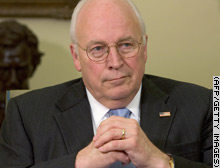|
|
Home | World | U.S. | Weather | Business | Sports | Analysis | Politics | Law | Tech | Science | Health | Entertainment | Offbeat | Travel | Education | Specials | Autos | I-Reports |
|
|
|
Home | World | U.S. | Weather | Business | Sports | Analysis | Politics | Law | Tech | Science | Health | Entertainment | Offbeat | Travel | Education | Specials | Autos | I-Reports |
|
Story Highlights• Agency head says Dick Cheney's office contends it's exempt from oversight order• Vice president's office tried to get oversight agency abolished, Democrat says • Vice president's office criticized for secrecy before Adjust font size:
WASHINGTON (CNN) -- Vice President Dick Cheney's office refused to cooperate with an agency that oversees classified documents, then tried to abolish the office when it challenged the actions, House oversight committee Chairman Henry Waxman said. The National Archives' Information Security Oversight Office is charged by presidential order with ensuring that classified information and documents are properly handled by executive branch agencies. According to a letter from William Leonard, director of the oversight office, Cheney's office argued it did not meet the definition of an executive branch agency and therefore was exempt. Leonard also wrote that Cheney's office suggested his agency be abolished under a revision of the presidential order now under consideration. (Watch how Cheney's office defines its role "I question both the legality and wisdom of your actions," Waxman, D-California, wrote in a letter Thursday to Cheney. "Your decision to exempt your office from the president's order is problematic because it could place national security at risk," wrote Waxman, chairman of the House Oversight and Government Reform Committee. Cheney's office would neither confirm nor deny it tried to abolish the Information Security Oversight Office. "We are confident that we are conducting the office properly under the law," said Megan McGinn, deputy press secretary for Cheney, when asked about the Waxman letter. The executive order -- intended to maintain the integrity of classified documents -- was established by President Clinton and revised by President Bush in 2003. The 2003 version directed the Information Security Oversight Office to oversee a program of education and supervision of classified document protection and maintenance. According to Waxman, the office has worked with different White House groups, including the National Security Council. But when the National Archives' office attempted to visit Cheney's team in 2004, it was prevented from doing so by Cheney's staff, Waxman wrote in the letter. The office had complied with the order in 2001 and 2002 but started refusing to do so in 2003. In 2006, Leonard wrote to Cheney's chief of staff, David Addington, to contest the office's refusal to comply and was told that the vice president's office "does not believe it is included in the definition of 'agency' as set forth in the order," nor is it an "entity within the executive branch that comes into the possession of classified information," according to letters released Thursday by Waxman's committee. In a letter to Attorney General Alberto Gonzales requesting intervention on the matter, Leonard questioned the rationale presented by the vice president's office. "If the [office of the vice president] is not considered an entity within the executive branch, I am concerned that it could impede access to classified information by the OVP staff, in that such access would be considered a disclosure outside the executive branch," Leonard wrote in January. Justice Department spokesman Erik Ablin said the department had received the letter and that matter is under review. The vice president's office has been criticized for being secretive before. Last month, it was revealed that the administration was withholding visitor logs to Cheney's residence. The administration says the secrecy is needed so Cheney can get candid advice from visitors. In 2001, the office refused to divulge the names of energy executives who had consulted with Cheney on U.S. energy policy. The decision was challenged and upheld by the courts. The U.S. Supreme Court referred the case back to a lower court. CNN's Adam Levine and Suzanne Malveaux contributed to this report  Vice President Dick Cheney's office would neither confirm nor deny it tried to abolish the National Archives' Information Security Oversight Office.
RELATED |